
The conference focused on the implementation of Circular No. 02/2025/TT-BGDDT, which officially introduced the Digital Competence Framework for Learners. The framework sets out a unified national standard for digital skills across six domains and 24 component competencies, ranging from information literacy and cyber security to responsible AI usage.
The conference, held at RMIT’s Saigon South campus on 11 July 2025, brought together over 600 delegates in person and online, including MOET officials, university leaders, international experts, and representatives from Vietnam’s major technology corporations such as IIG, Katalon, KMS Technology and NAB Vietnam.
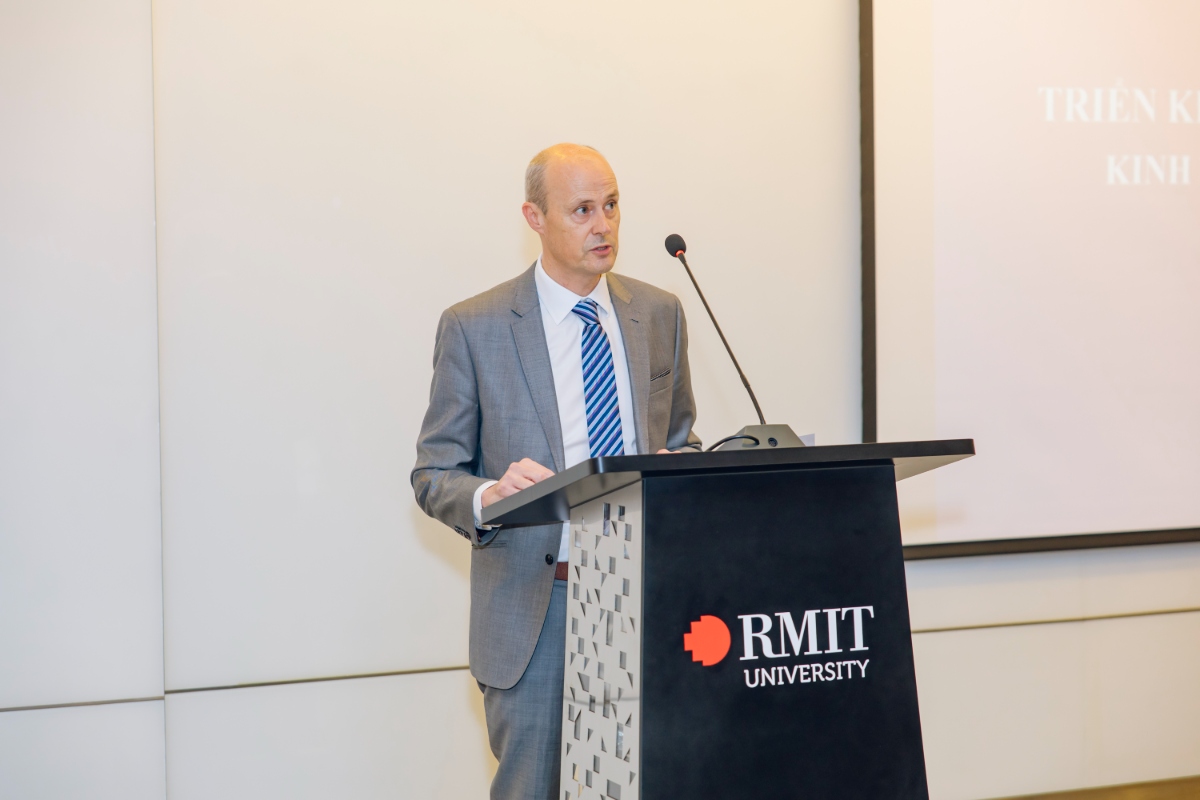 Professor Scott Thompson-Whiteside – the newly appointed Pro Vice-Chancellor and General Director of RMIT Vietnam – delivers the opening remarks, reaffirming RMIT’s commitment to partnering with the Ministry of Education and Training to enhance digital capabilities for learners.
Professor Scott Thompson-Whiteside – the newly appointed Pro Vice-Chancellor and General Director of RMIT Vietnam – delivers the opening remarks, reaffirming RMIT’s commitment to partnering with the Ministry of Education and Training to enhance digital capabilities for learners.
The event marked a pivotal step in realising Vietnam’s Resolution No. 57-NQ/TW on the breakthrough development of science, technology, innovation, and digital transformation, particularly in the education sector.
As a leader in technology-led curriculum and pedagogy, RMIT continues to bridge academic excellence with real-world innovation, blending advanced digital knowledge with practical leadership, experiential learning, and strong industry engagement to prepare graduates for the digital future.
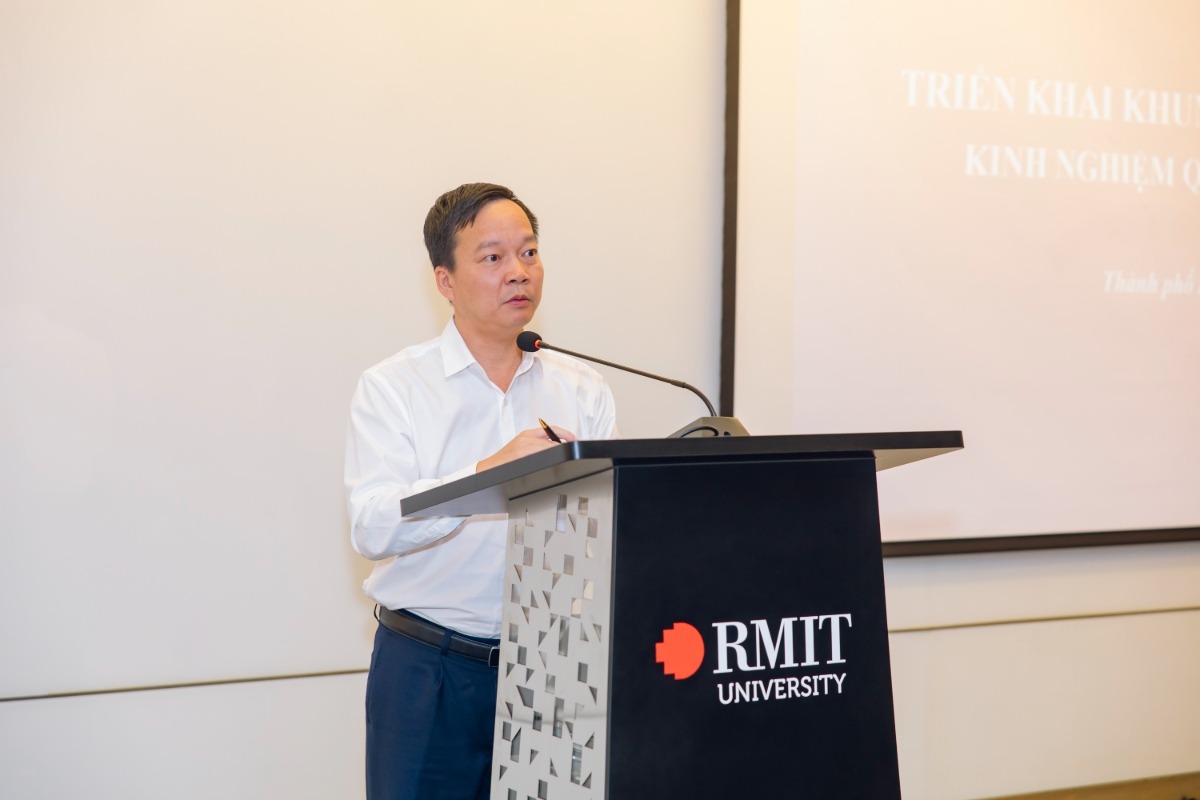 Mr Nguyen Anh Dung – Deputy Director General of the Higher Education Department at the Ministry of Education and Training – addresses the conference, underscoring the strategic role of higher education in implementing the Digital Competence Framework for Learners.
Mr Nguyen Anh Dung – Deputy Director General of the Higher Education Department at the Ministry of Education and Training – addresses the conference, underscoring the strategic role of higher education in implementing the Digital Competence Framework for Learners.
In his welcome remarks, Professor Scott Thompson-Whiteside, the newly appointed Pro Vice-Chancellor and General Director of RMIT Vietnam, reaffirmed the University’s commitment to supporting MOET’s education reform efforts. “As we reimagine learning in a digital era, this framework offers a powerful opportunity to embed inclusive, adaptive, and future-focused practices into education,” said Professor Thompson-Whiteside.
“At RMIT, we integrate AI and emerging technologies into flexible learning formats - online, hybrid, and blended - to support personalisation and accessibility. We’re proud to partner with MOET in building national capacity in digital competence.”
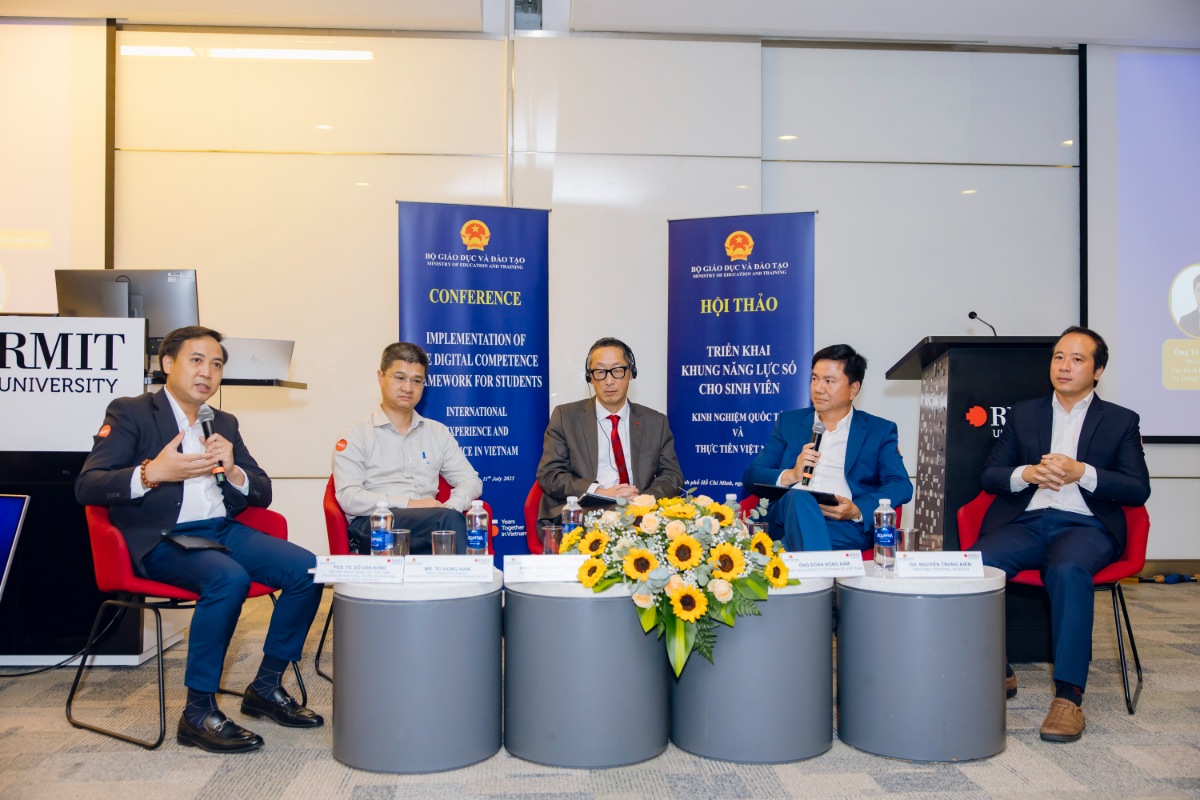 Experts, university leaders, and representatives from leading technology companies take part in a panel discussion, sharing practical strategies and lessons learned in implementing the Digital Competence Framework across higher education.
Experts, university leaders, and representatives from leading technology companies take part in a panel discussion, sharing practical strategies and lessons learned in implementing the Digital Competence Framework across higher education.
Mr Nguyen Anh Dung, Deputy Director General of the Higher Education Department at the Ministry of Education and Training, emphasised the strategic value of the Digital Competence Framework in shaping the future of Vietnam’s education system in the digital era.
“Higher education must take the lead in equipping learners with digital competence – not only to adapt to a rapidly changing environment, but also to pursue a long-term goal: positioning Vietnam as a driver of progress in this field, both nationally and internationally,” he said.
He noted that implementing the framework requires institutions to proactively select models that suit their unique contexts – from developing standalone courses and training educators to establishing effective assessment systems.
“This is not just a technical solution, but a sustainable development strategy to enhance the quality of education and the competitiveness of students in the digital economy,” he added.
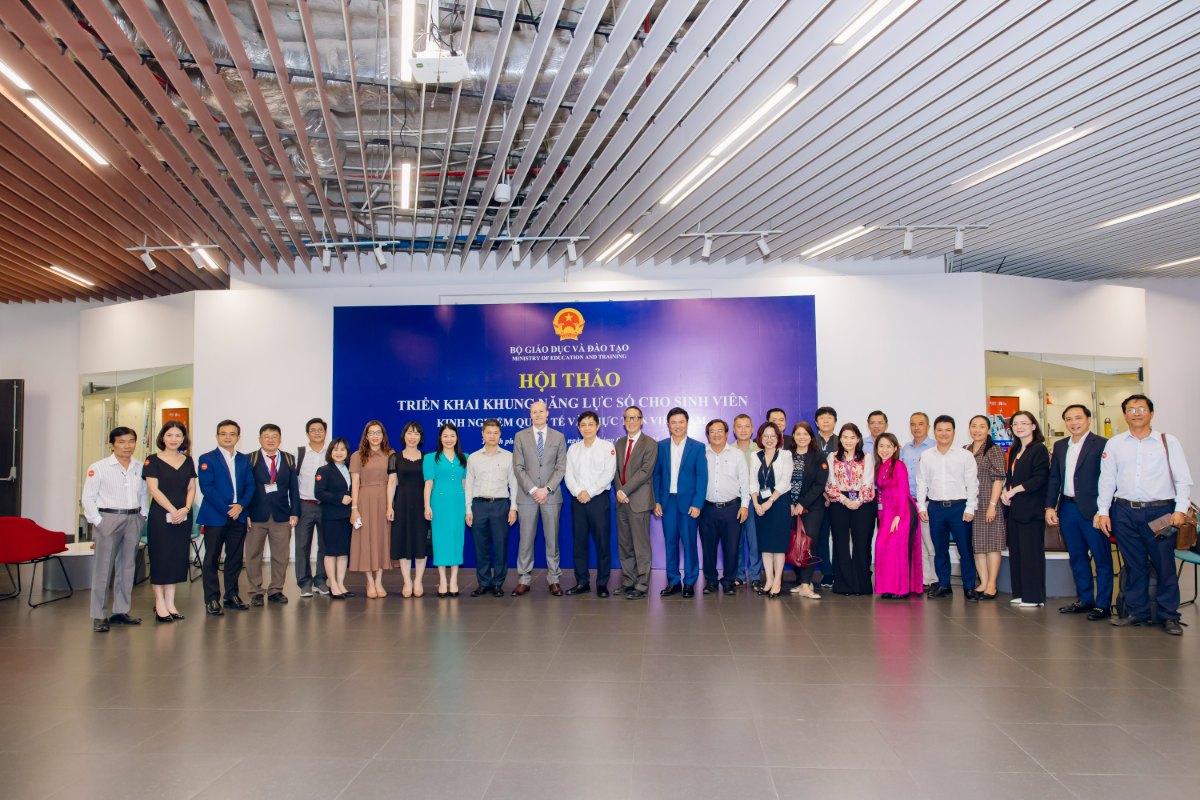 Delegates take a group photo after the conference, reaffirming their joint commitment to strengthening digital capabilities and advancing digital transformation across Vietnam’s higher education sector.
Delegates take a group photo after the conference, reaffirming their joint commitment to strengthening digital capabilities and advancing digital transformation across Vietnam’s higher education sector.
RMIT also shared its practical experience in embedding digital capabilities across curriculum, assessment, and academics’ professional development. In his keynote speech, Professor Sherman Young, RMIT Vice President and Deputy Vice-Chancellor (Education), highlighted the University’s approach to integrating emerging technologies, including AI, to strengthen learning outcomes and graduate employability.
Throughout the program, delegates exchanged views, experiences, and solutions around implementing the Digital Competence Framework in higher education. Many universities across the country presented their initial efforts – from curriculum redesign and developing digital skills assessment systems to upskilling academic staff. The discussions reflected a clear shift from policy alignment to practical action, aiming to localise digital education strategies to the specific contexts of each institution and learner group.
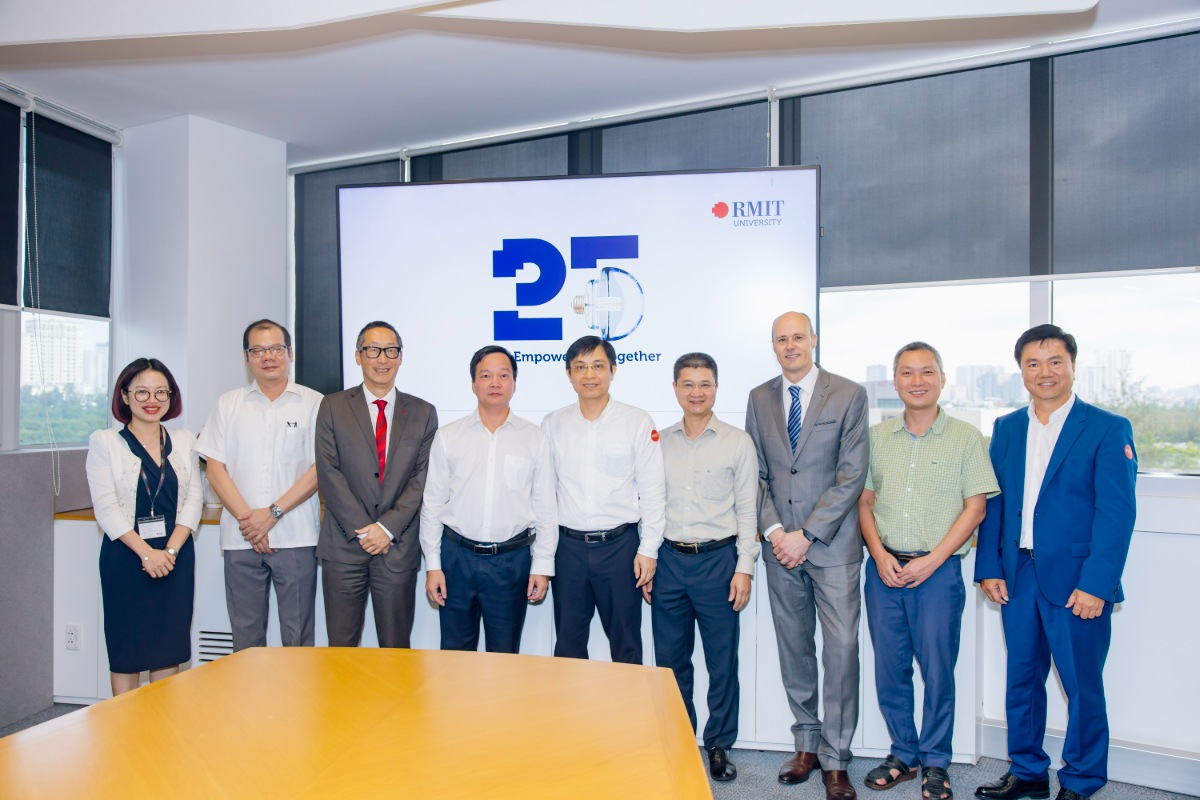 RMIT leadership meets with representatives from the Ministry of Education and Training, the Office of the Government, and participating universities at the conference.
RMIT leadership meets with representatives from the Ministry of Education and Training, the Office of the Government, and participating universities at the conference.
Key enablers for success were also identified: strong leadership, whole-of-institution commitment, long-term investment in professional development, and a supportive ecosystem. Many delegates called for stronger collaboration between government, educational institutions, and industry to ensure digital competence becomes a foundational, sustained capability in higher education – not a one-off initiative.
The conference concluded with a shared commitment from all participants: to ensure every learner – regardless of discipline or background – is equipped with the knowledge, tools, and ethical mindset to thrive in an increasingly digital world. Collaboration between MOET, RMIT, Vietnam National University (Hanoi) and educational institutions will serve as a solid foundation to drive digital transformation in higher education and shape a future-ready generation of learners who are confident, creative, and digitally empowered to lead Vietnam’s digital future.
Story: Quan Dinh H.
Hidden costs in the supply chain could price some Vietnamese exporters out of Europe.
RMIT Vietnam continues long-term commitment to talent development with its record 2026 Scholarship program worth more than 200 billion VND.
Vietnam’s new Atomic Energy Law opens the door to advanced nuclear technologies, but success will hinge on grid readiness, safety culture, and skilled people, say RMIT University Vietnam academics.
As Vietnam’s Law on Atomic Energy takes effect on 1 January 2026, nuclear power is back in the spotlight as a strategic pillar for energy security and carbon neutrality.